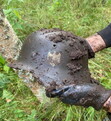
The Battle of Moscow
The battle of Moscow marked the collapse of Hitler's “Operation Barbarossa”, which aimed to conquer the USSR in just 12 weeks. The Blitzkrieg strategy, which had been highly effective for the Germans in Europe, failed in Russia.

The Battle of Kursk
After the defeat of German forces at Stalingrad in early 1943, the Soviet command began to actively build up its forces. In response, the German command developed Operation "Citadel," aimed at encircling and destroying Soviet troops in the Kursk area.

Heer (Wehrmacht) helmets from World War II
StalingradFront.com is the largest online store in the world specializing in selling Heer (Wehrmacht) helmets. We consistently have over 2,000 different World War II-era helmets in stock.

WW2 German awards and medals
The Nazi Germany awards system mainly took shape during World War II. Before September 1, 1939, it hardly existed: there were many party and departmental awards, such as for service in the Wehrmacht, service in the Waffen SS, for party service, and so on.

World War II dug-out aircrafts
What is the most incredible find during excavations at WWII battle sites? Many will say - helmet Waffen SS, Knight's Cross of the Iron Cros or a whole tank! And how would you feel if you found, for example, a Focke-Wulf or IL2 aircraft? In this article, there will be many photographs digging up WW2 aircraft with a description of the places where they were found, including the history of the crash.

The Battle of Stalingrad short description
The Battle of Stalingrad was the largest and bloodiest battle in world history. It lasted over six months, from July 17, 1942 to February 2, 1943. More than 2 million soldiers took part in it. Soviet forces faced not only German troops but also Romanian, Italian, Croatian, and Hungarian forces during the battle.

Stories from the front
Interesting stories about the Second World War coming from the Soviet soldiers and officers, rear workers and civilians.

Romania as an ally of Nazi Germany on the Eastern Front of WW2
From 1941-1944, up to 30 divisions of the Romanian army took part in the war against the USSR. In general, during the war, on the side of Hitler Germany, Romania lost 600 thousand people (of which 400 thousand were irretrievable losses). As you know, the Romanian army was the largest among the allied forces of Germany.
